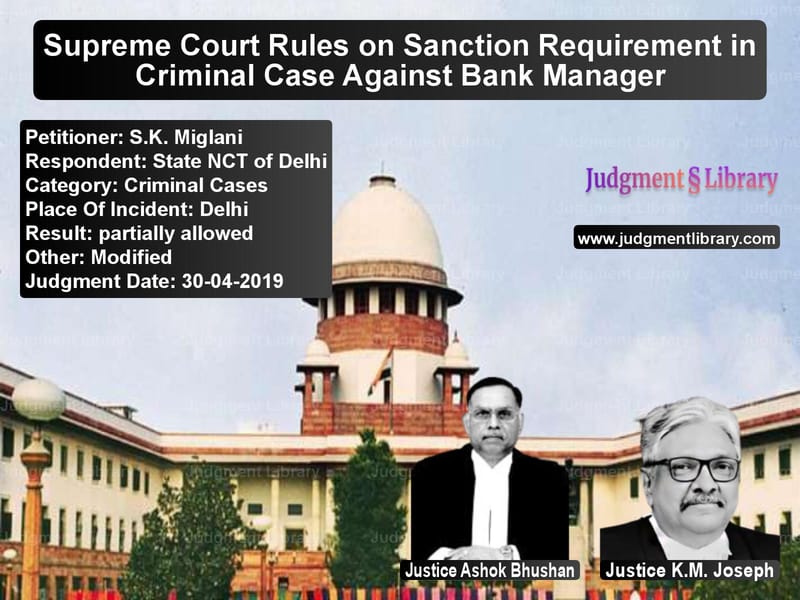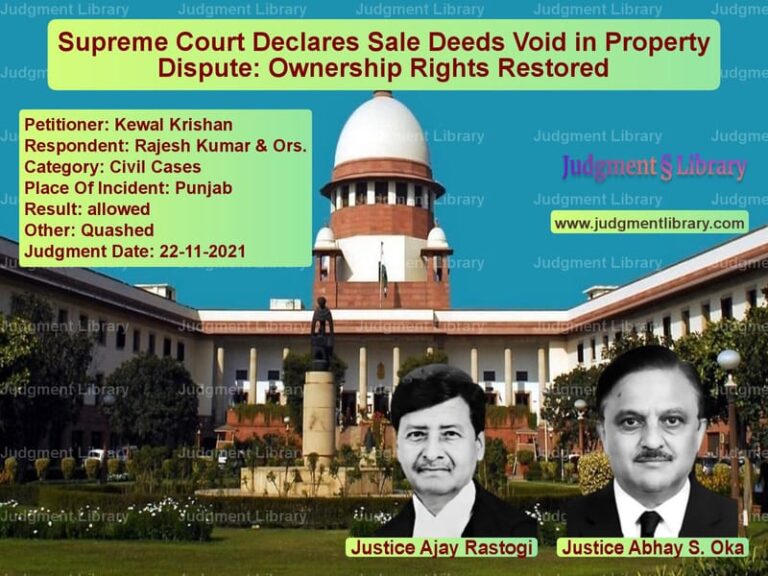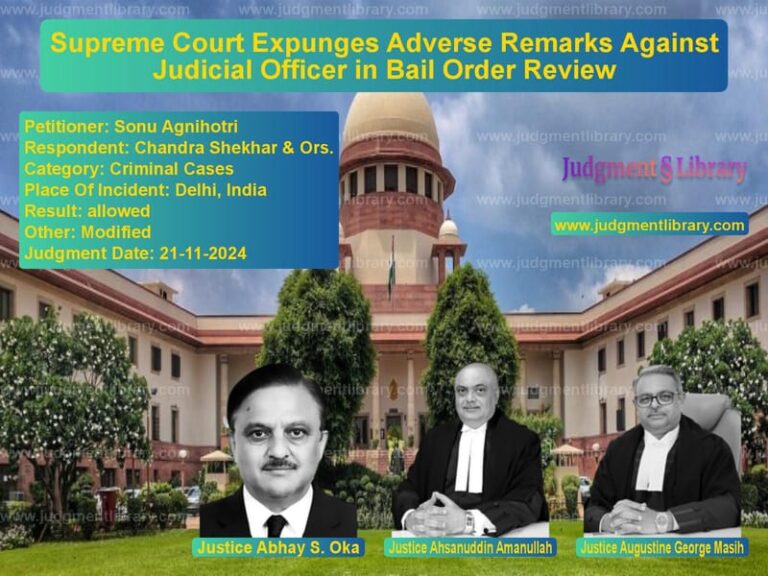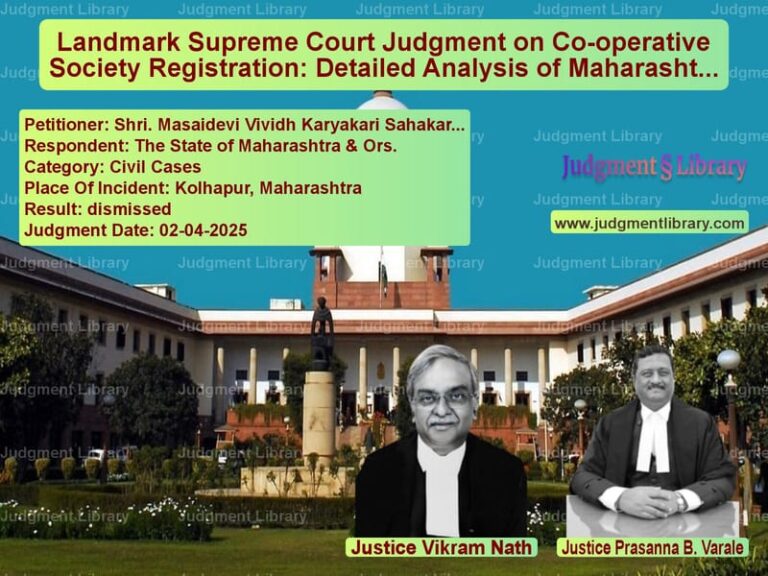Supreme Court Rules on Sanction Requirement in Criminal Case Against Bank Manager
The Supreme Court of India, in its judgment dated April 30, 2019, decided an important issue concerning the requirement of sanction under Section 197 of the Code of Criminal Procedure (CrPC) before prosecuting a public servant. The case involved S.K. Miglani, a bank manager accused of facilitating the opening of a fraudulent bank account, which was allegedly used to encash a fraudulent refund cheque issued by the Delhi Development Authority (DDA). The Supreme Court upheld the decision of the Delhi High Court, stating that no prior sanction was required to prosecute the appellant, as his actions were not in the discharge of his official duties.
Background of the Case
The appellant, S.K. Miglani, was working as a manager at the Bank of Baroda, Faridabad branch, at the relevant time. A complaint was filed against several DDA officials and private individuals, alleging that they had conspired to fraudulently reduce the cost of a DDA flat and misappropriate funds. The fraud involved processing a forged request from an original allottee, which led to the issuance of a refund cheque amounting to Rs. 2,22,263.
The prosecution alleged that Miglani facilitated the opening of a savings bank account (No. 33604) in the name of the original allottee, using forged documents. The cheque was then encashed through this account. As a result, an FIR was registered against him and other accused persons under Sections 201, 409, 419, 420, 467, 468, 471, and 120-B of the IPC.
Proceedings Before the Lower Courts
Following the investigation, a charge sheet was filed, and charges were framed against the appellant under Sections 465 and 120-B of the IPC. The appellant filed an application before the Chief Metropolitan Magistrate (CMM), Saket Court, New Delhi, seeking discharge on the ground that no prior sanction had been obtained from the competent authority under Section 197 CrPC.
The CMM rejected the application, holding that:
- The allegations against the appellant involved forgery, which could not be considered an act performed in the discharge of his official duties.
- Since he was a bank manager, he was not a public servant whose removal required sanction from the government.
The appellant then approached the Delhi High Court, which upheld the CMM’s decision and dismissed his application. Aggrieved by the order, he filed an appeal before the Supreme Court.
Petitioner’s (Appellant’s) Arguments
- The appellant, as a bank manager, was a public servant, and hence, his prosecution required prior sanction under Section 197 CrPC.
- The act of opening a bank account was done as part of his official duties, and any alleged wrongdoing should have been addressed through departmental proceedings rather than criminal prosecution.
- The prosecution’s reliance on handwriting experts was weak evidence that could not be the sole basis for criminal prosecution.
Respondent’s (State’s) Arguments
- The alleged offense involved forgery and criminal conspiracy, which were beyond the scope of an official duty.
- The appellant had knowingly facilitated the opening of a fraudulent bank account, which led to the misappropriation of public funds.
- The Supreme Court, in Prakash Singh Badal vs. State of Punjab (2007), had ruled that offenses such as cheating, forgery, and conspiracy could not be considered as acts done in official capacity and did not require prior sanction for prosecution.
Supreme Court’s Observations
The Supreme Court upheld the decisions of the lower courts, making the following key observations:
- Section 197 CrPC applies only to public servants who cannot be removed from their office except by or with the sanction of the government. The appellant, as a bank manager, was not in such a position.
- Acts such as forgery, conspiracy, and cheating could not be considered part of a public servant’s official duties.
- The Supreme Court referred to its decision in K.Ch. Prasad vs. J. Vanalatha Devi (1987), which had held that a bank employee, though a public servant, does not require sanction under Section 197 for prosecution.
- The Court criticized the CMM’s order for making a conclusive statement about forgery at the pre-trial stage, stating that such conclusions should be reserved for trial.
Final Judgment
The Supreme Court ruled:
“We uphold the order of the High Court as well as the order of the CMM rejecting the application under Section 197 Cr.P.C. on the ground that the appellant was not removable from his office save by or with the sanction of the Government.”
However, the Court modified the CMM’s order by removing the specific finding that the appellant had committed forgery, stating that such determinations should be made only after a full trial.
Impact of the Judgment
This ruling has significant legal implications:
- Clarifies the Scope of Section 197 CrPC: Reinforces that only certain categories of public servants require sanction for prosecution.
- Limits Protection for Public Servants: Establishes that fraudulent acts such as forgery and conspiracy cannot be shielded by official duty.
- Ensures Accountability: Allows criminal proceedings against bank officials and other public servants engaged in financial misconduct.
- Sets Precedent for Future Cases: The ruling serves as a guideline for determining when prior sanction is required for prosecuting public servants.
Conclusion
The Supreme Court’s decision in S.K. Miglani vs. State NCT of Delhi is a significant ruling that reinforces accountability in financial institutions. By denying the appellant the protection of Section 197 CrPC, the Court has ensured that public servants engaged in financial fraud cannot escape criminal liability under the guise of official duty. The judgment establishes a clear precedent that acts involving forgery, conspiracy, and fraud are not protected under the legal shield meant for legitimate official actions.
Petitioner Name: S.K. Miglani.Respondent Name: State NCT of Delhi.Judgment By: Justice Ashok Bhushan, Justice K.M. Joseph.Place Of Incident: Delhi.Judgment Date: 30-04-2019.
Don’t miss out on the full details! Download the complete judgment in PDF format below and gain valuable insights instantly!
Download Judgment: S.K. Miglani vs State NCT of Delhi Supreme Court of India Judgment Dated 30-04-2019.pdf
Direct Downlaod Judgment: Direct downlaod this Judgment
See all petitions in Fraud and Forgery
See all petitions in Money Laundering Cases
See all petitions in Bail and Anticipatory Bail
See all petitions in Judgment by Ashok Bhushan
See all petitions in Judgment by K.M. Joseph
See all petitions in partially allowed
See all petitions in Modified
See all petitions in supreme court of India judgments April 2019
See all petitions in 2019 judgments
See all posts in Criminal Cases Category
See all allowed petitions in Criminal Cases Category
See all Dismissed petitions in Criminal Cases Category
See all partially allowed petitions in Criminal Cases Category







